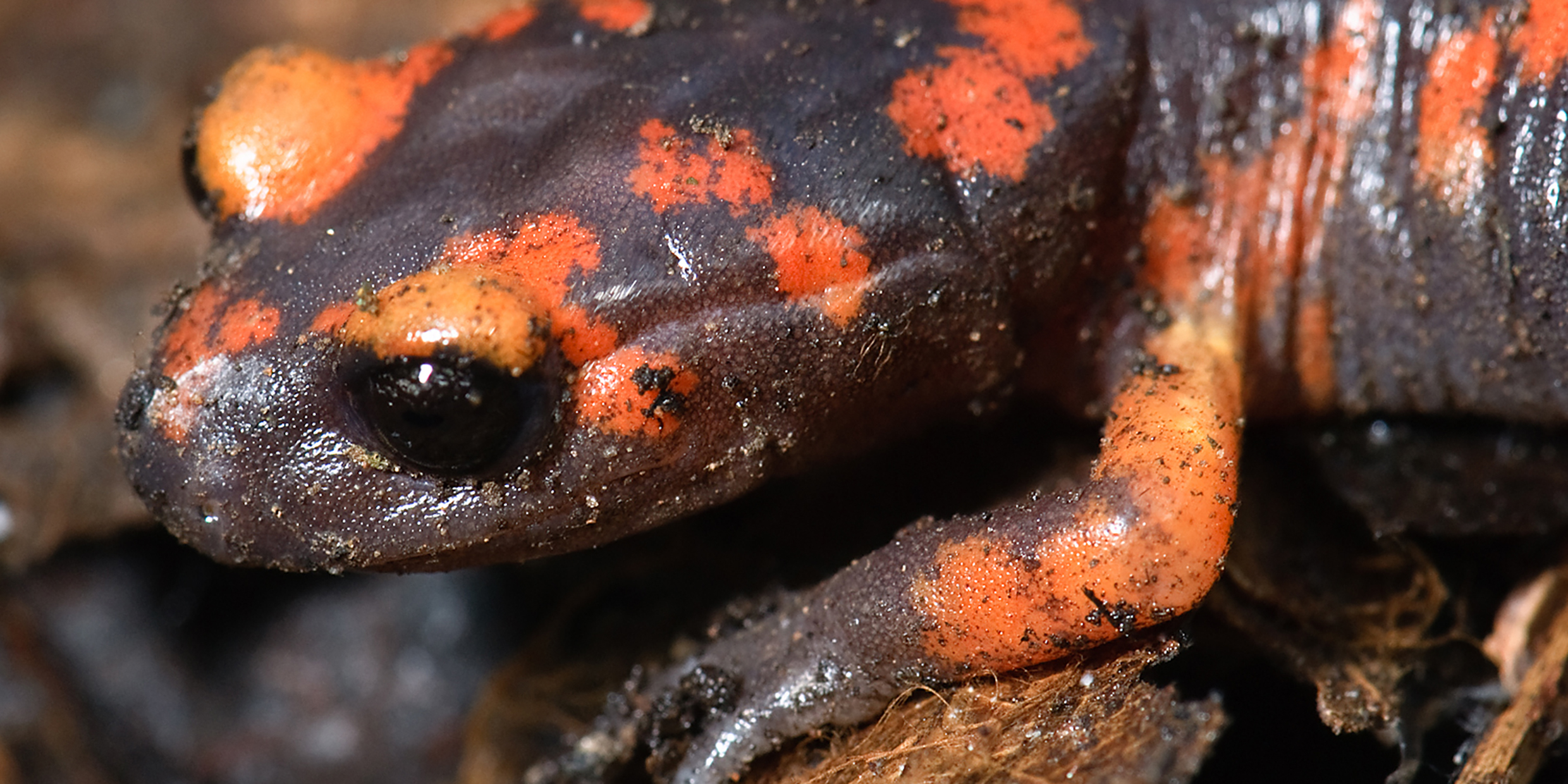Originally published 1 July 2007
A telling tale from Richard Dawkins’ The Ancestor’s Tale is the tale of the tailed salamanders that live in the mountains around California’s Central Valley (but not on the valley floor).
In the hills at the southern end of the valley there are two kinds of salamanders of the genus Ensatina, one with yellow and black blotches, and another uniform light brown with no blotches. The two varieties do not interbreed, and therefore, by the usual definition, are considered separate species.
In the mountains at the north end of the Central Valley there is only one kind of Ensatina, intermediate in appearance between the blotched and the unblotched southern species.
Now here’s the trick. Take a journey down the hills to the east of the valley and the northern salamanders become progressively more like the blotched southerners. Journey down the hills to the west of the valley, and the northern salamanders become increasingly similar to the unblotched southerners. At every point along both journeys, salamanders can breed with their immediate neighbors — until they encounter “the other.”
Now I think you can see where this is going. Assume ancestral semi-blotched salamanders arrive in the northern mountains, then their descendants migrate down both sides of the elongated Central Valley, gradually evolving. When they meet in the south, closing the ring, they have become so different that they cannot interbreed. They have become separate species.
But where around the ring shall we draw the line that separates the species? asks Dawkins.
Let’s take another example. Humans and chimps live side by side in Africa, two obviously separate species. But trace their ancestry back in time and we find a common ancestor. A ring of descendants in time, rather than in space. The only reason we don’t see the intermediates is that they are all dead. Only where the ancestors of chimps and humans were luckily fossilized and we are lucky enough to find the fossils can we reconstruct the record of gradual evolution. Again, as for the salamanders, there are no gaps in the ring of time that separate us from our chimp cousins, no obvious place (or time) to draw a dividing line between “us” and “them.”
The moral Dawkins derives from the salamander’s tale is what he calls “the tyranny of the discontinuous mind” — a tendency of the human mind to want black-and-white categories. The fixity of species is a constant refrain of creationists, for example; after all, they have to decide who gets in the Ark, two by two. Do we let in both blotched and unblotched salamanders, or just a semi-blotched pair and hope that evolution will generate the rest when the waters subside? Or what about the contentious abortion debate? Is a fertilized egg human? Half-human? One-thousandth human? Another example: When does a “child” become an “adult” and therefore legally drink, or drive, or serve in the military. Obviously, these distinctions are important, and are fixed when necessary by law or convention, but relevant discontinuities are far from clear.
When the mind fixates on absolute discontinuities, mischief is often in the offing, says Dawkins. This is a theme I have often addressed on this blog: What I have called the virtue of gray.
I was raised in a tradition of absolutist distinctions. Roman Catholicism was the true faith; all others were untrue. Every action was a sin or it wasn’t. Even within the category of sin there were absolutist distinctions. A venial sin might merit a brief turn in purgatory; dying with a mortal sin on your soul meant you burned forever in hell. If you were baptized, you might go to heaven; unbaptized, eternal punishment. Unbaptized babies were consigned to a special place called limbo. And not just matters of religion. In the Tennessee of my youth public water fountains and toilets were labeled White and Colored. Never mind that many whites in Tennessee had some black blood in their veins, and vice versa for blacks; the tyranny of the discontinuous mind admits no such mixing. It’s us and them. White and black. Good and evil. Saved and damned.
Absolutist categories are sometimes appropriate in physics and chemistry. Gold is gold, and silver is silver. A critical mass of radioactive material is necessary for an atomic explosion; it will blow or it won’t. But in virtually all matters pertaining to life and consciousness, absolutist definitions are fraught with menace.
If I learned anything from my years of study of science, it is to beware of absolutes. I look back on the religious and racial categories of my childhood and wonder that anyone can allow themselves to become so tyrannized by such foolish distinctions. Was masturbation a venial or a mortal sin? Everything depended on the answer. If I died in mortal sin without making an Act of Contrition, I would spend eternity in hell. What unnecessary anxiety these silly distinctions caused. Worse is the pain, misery, even death we inflict on one another because of our unwillingness to confront a world of gray.
If the blotched and unblotched salamanders at the southern end of California’s Central Valley were humans, they might well see each other as appropriate targets of discrimination, pogrom, jihad, or crusade. But if a blotched salamander took a counterclockwise journey around the ring, or if a unblotched salamander took a clockwise journey, they might have a rather more inclusive view of their relationship. What is true for spatial rings is also true for evolutionary rings in time. Nowhere on any journey into the past and forward again in time would we meet a “neighbor” who is decisively “other.” The ethical implications of the salamander’s tale may be partly what Darwin had in mind when he spoke of “a grandeur” in the evolutionary view of life.



